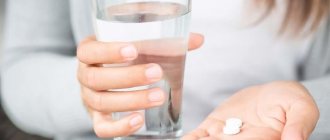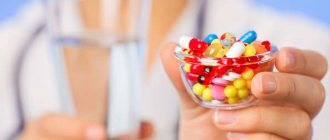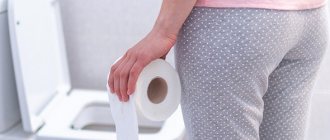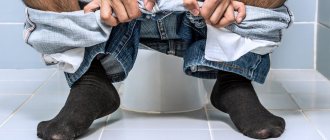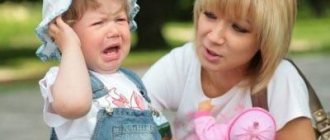Home > Articles > Diarrhea in a child after taking antibiotics
26.02.2020
The antibiotics have been completed, the underlying disease has been treated, but the baby’s health is far from ideal. He suffers from abdominal pain and upset bowel movements.
Why does antibiotic-induced diarrhea start? After all, they were supposed to kill the pathogenic flora? We will look into this issue, and at the same time we will find out how to cope with this new illness that has overtaken the child.
Why do antibiotics cause diarrhea?
Because pharmacology has not yet invented drugs with strictly selective action. Such developments are underway - there is even talk of special nanorobots. But this is a matter for the future, and in the present they kill not only harmful, but also beneficial bacteria.
In the human intestine the balance of power is as follows.
- Lacto-, bifidobacteria and E. coli play a creative role, accelerating the breakdown of food, alkalizing the body, and promoting the maturation of immune cells. They should make up from 60 to 90% of the total microflora of a healthy person.
- A small part - 2-5% - consists of microorganisms that occupy a neutral position - they do not harm, but also do not bring tangible benefits.
- And finally, the remaining percentage consists of antagonist bacteria, which are divided into two camps.
The first is opportunistic, which cause damage when their number becomes too large (clostridia, klebsiella, etc.). The second is definitely pathogenic microbes, they cause harm as soon as they enter the body (salmonella, shigella, etc.), no matter in what quantity.
Their natural enemies, the beneficial flora, are called upon to keep the number of opportunistic microflora within the normal range. But when antibiotics damage its colonies, it stops coping and the balance is upset (this is dysbiosis).
How to recognize an infection?
The most common infection is rotavirus
One of the most dangerous causes of diarrhea is infection: most often it is caused by rotavirus, but salmonella, staphylococcus, enterococcus and other bacteria can enter the intestines. Bacterial infection can lead to severe toxicosis and dehydration, so it is important to react in time to the onset of the disease and provide assistance as quickly as possible. Parents of babies under six months need to especially hurry - dehydration develops rapidly and in rare cases it becomes the cause of death. Diarrhea is the body’s protective reaction to foreign microorganisms, and in case of infection it will be accompanied by several symptoms:
- Temperature increase. It can reach 39 degrees, and help must be provided as soon as possible. In infants, the temperature is most often measured rectally: a thermometer is smeared with Vaseline and inserted 2 cm into the anus. Temperature measurement takes 3 minutes.
- The appearance of stool with mucus, there may be blood streaks in it. The discharge becomes frequent and watery.
- The child becomes lethargic and drowsy, tears do not appear when crying, in addition, drying of the lips and mucous membranes may occur. All this indicates dangerous dehydration, and measures should be taken as soon as possible.
- Repeated vomiting, refusal to eat. The child will be lethargic and pale, and signs of general malaise will appear.
If signs of infection appear, it is necessary to call an ambulance: the baby and his mother will be hospitalized in a hospital, and he will be prescribed intensive care. Only a doctor can prescribe the right medications: you cannot use any “folk remedies” and wait until everything goes away on its own. Moreover, you should not give “adult” medications to a small child: an incorrect dosage can lead to additional poisoning and subsequent dysbacteriosis.
Infectious lesions of the body often develop rapidly: in just a few hours, a fever appears, vomiting, frequent sharp stools are observed, the child begins to cry and refuses to eat. Repeated vomiting and frequent bowel movements are the most common signs of infection and should be addressed quickly.
How quickly will the body recover?
If we are talking about a temporary weakening of beneficial microflora, it usually takes 5-14 days to return to normal. During this period, you can put your child on a prebiotic diet.
Prebiotic foods are organic substances that serve as food for positive bacteria. If you eat more of them, you can reduce the time required for recovery. Celery, bananas, Jerusalem artichoke, zucchini, beans, soybeans, and artichokes will be beneficial.
It is worth enriching your diet with natural probiotics (live beneficial bacteria). They are found in kefir, buttermilk, live yoghurts, miso soup, and cheese.
If you suspect dysbacteriosis, you should not self-medicate - consult a doctor and take a special test.
How do digestive pathologies manifest themselves?
Diarrhea is dangerous due to dehydration of a small child.
Metabolic disorders and problems with the production of enzymes necessary for digestion usually develop in the first weeks of life, and frequent loose stools are only one of the signs. Now such pathologies are becoming more common: developmental disorders, non-compliance with diet during pregnancy, poor environmental situation - all this leads to the fact that the child’s body is not ready to digest regular food, and it requires special conditions.
Metabolic disorders manifest as slow growth and poor weight gain. Since the baby does not receive enough nutrients, he cannot fully develop, and he needs qualified help as soon as possible. Skin rashes indicate a disruption in the production of enzymes, and sometimes bloating occurs. There are several types of such diseases:
- Lactose deficiency. In this case, a baby receiving breast milk or regular formula suffers from the inability to digest lactose, one of the components of milk. From the first days of life, diarrhea appears, and it will be greenish in color with the appearance of foam and a sour smell. Vomiting may occur, and symptoms of toxicosis may develop. The main treatment is to switch to lactose-free formulas; this usually allows the digestive system to completely normalize within a month. A late diagnosis can lead to various developmental disorders, so it is important to seek medical help as soon as possible.
- Celiac disease. This is an intolerance to gluten, a protein found in cereals. If it is not absorbed, it will damage the intestinal mucous membranes, causing diarrhea. Diarrhea will appear after foods containing gluten are introduced into the diet: bread and any baked goods. In this case, diarrhea will be profuse, and the stool will have a pronounced unpleasant odor. At the same time, the abdominal circumference increases, the child’s body becomes disproportionate. After giving up gluten, the condition gradually returns to normal.
- Cystic fibrosis is a rarer hereditary disease. It is manifested by the inability to transport chlorine ions, and the biological secretions of the respiratory and other systems begin to thicken. The external manifestation will be frequent loose stools, which will be shiny due to undigested fat. Symptoms appear around the second week of life. Treatment will be the administration of special enzymes and a low-fat diet.
All metabolic abnormalities require correction as quickly as possible. Modern treatment methods make it possible to reduce their manifestations to a minimum, and the child will be able to grow and develop normally.
What will help the child?
But while recovery is underway, it is necessary to do something about diarrhea, which causes a lot of trouble and dehydrates the body.
The elimination of its symptoms is facilitated by the Regidron Bio solution, which is given to children from 3 years of age or with a body weight of 12 kg. The product helps bring the body's water-salt balance back to normal. It contains pro- and prebiotic components: lactobacilli rhamnosus GG (promote the healing of damaged microflora) and maltodextrin (serves as a nutrient medium for beneficial bacteria).
Remember to give your child plenty of clean drinking water. Additionally, you can use fruit drinks, compotes, rice water is useful - it has a fixing effect.
Symptoms
If you take an antibiotic, the medicine will cause mild changes in the number of intestinal bacteria, which may lead to diarrhea over several days or weeks. This type of diarrhea is called antibiotic-associated diarrhea. If the changes in the number of these microorganisms are more dramatic, you may have the following symptoms:
- watery diarrhea - severe diarrhea of water in children and adults, which can also be caused by bacterial and viral infections, leading to the release of electrolytes and fluid into the intestinal lumen;
- pain when pressing on the stomach is usually acute and requires immediate medical attention;
- spasmodic pain in the abdomen - occurs due to convulsive muscle contractions, which is associated with a temporary narrowing of the intestinal lumen;
- temperature. Even a slight increase in body temperature up to 37 °C is a reason to visit a specialist.
If the causes of diarrhea are not clear, but you are taking antibiotics, be sure to tell your doctor the name of the prescribed drug, the date you started taking it and the onset of intestinal symptoms. In most cases, your doctor will be able to diagnose antibiotic-associated diarrhea based on your symptoms, treatment history, and examination.
Up to contents
Prevention
It is easier to prevent any pathology than to treat it.
- Do not prescribe antibiotics to your baby yourself, even if you notice the same symptoms as during a previous episode of illness.
- Do not give medicine on an empty stomach.
- Ask your doctor: is it worth taking probiotics at the same time as antibiotics? Especially if the baby already had diarrhea after such therapy.
Discuss all your steps with your doctor in as much detail as possible: what to feed your child, how to help him recover. And remember - his health is in your hands!
Prevention and treatment of coronavirus in children
Treatment of Covid in children is no different from symptomatic treatment of other acute respiratory viral infections. There are currently no specific medications for the treatment of COVID-19 in children. Therapy is usually aimed at alleviating the symptoms of the disease and preventing the development of a bacterial infection.
Typically, for mild to moderate forms of COVID-19, the pediatrician gives the child the following prescription:
- bed rest, maximum limitation of contacts;
- moist cool indoor air;
- drinking plenty of water;
- washing the nasal mucosa with saline solutions;
- gargling with antiseptics;
- antipyretics for high temperatures (above 38.5 °C);
- enterosorbents for digestive problems;
- antitussives and vasoconstrictors;
- antihistamines.
In case of a complicated course of the disease, antibacterial drugs and drugs that normalize respiratory function are prescribed.
If it is necessary to undergo routine vaccination, a child can be vaccinated after Covid two weeks after complete recovery.
To minimize the likelihood of a child becoming infected with coronavirus, it is necessary to maintain personal hygiene : wash your hands more often (at least 20 seconds), use antibacterial wipes. As often as possible, treat gadgets, toys, door handles, and work surfaces with antiseptics.
It is necessary to ensure that children do not touch their face or eyes with their hands. Maintain water and drinking regime. Pediatricians recommend irrigating the nasal cavity with saline solutions after visiting public places. You should also spend more time in the fresh air and regularly ventilate the room.
Children are tested for coronavirus, including when the child comes into contact with a person confirmed to have COVID-19.
If a mask regime is in place, all children over 12 years of age must wear a mask with the same requirements as adults. For children from 6 to 11 years old, wearing a mask is recommended if adults can monitor its correct use, including timely replacement of the mask.
How to deal with dehydration due to diarrhea?
The color and smell of stool during diarrhea carry maximum information
Dehydration is one of the most dangerous consequences of diarrhea and should be stopped as quickly as possible. A loss of 5% or more of a child’s body weight is considered dangerous, and in infants a life-threatening condition can develop very quickly. Severe dehydration is indicated by lethargy, sunken fontanel; in severe cases, the skin becomes flabby, and the nose and fingertips may become blue. Before the ambulance arrives, parents must themselves help the child cope with dehydration. With a slight degree of dehydration, the loss of fluid can be compensated for by various types of fluid:
